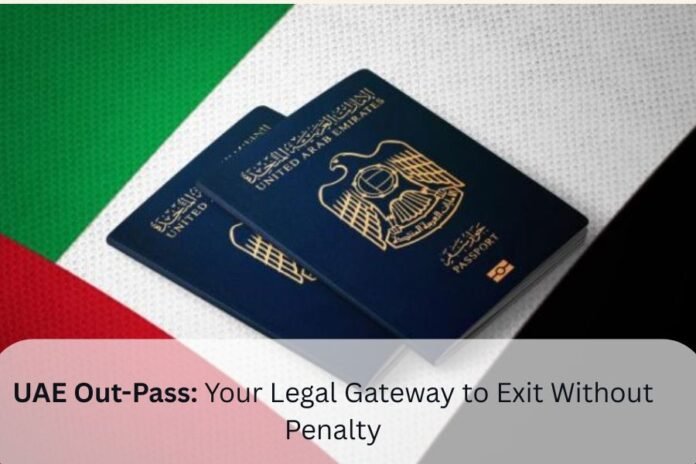UAE Out Pass: Everything You Need to Know Before Exiting the UAE
Ever traveled to the UAE for business or vacation, only to find yourself with a visa problem that has you scrambling to determine how to leave? It’s an experience thousands experience each year, unintentional overstaying, a revoked visa, or even a missing passport, making a quick exit a bureaucratic nightmare. But there’s an easy solution that can have you on that plane without endless frustration.
This article deconstructs the UAE out pass from beginning to end, detailing what it is, who requires one, and how to have it sorted out quickly. Whether you’re navigating fines or simply want to leave comfortably, these facts will empower you with the information to approach it confidently.
What Actually Is a UAE Out Pass?
A UAE out-pass, also referred to as an exit permit, is a shor
t-term travel document administered by the immigration authorities. It allows individuals to leave the country legally when other visa options become available do not. Consider it a transition for those stuck in visa purgatory, without one, trying to take a flight might result in detention or a large fine at the airport.
This permit comes into action primarily for residents or guests whose stay has deviated from the course. UAE regulations are stringent regarding immigration, and this document ensures compliance while facilitating a smooth exit. Issued by the likes of the General Directorate of Residency and Foreigners Affairs (GDRFA) or the Federal Authority for Identity, Citizenship, Customs & Port Security (ICP), it usually holds for a brief period, prompting you to leave soon.
Who Needs an Out Pass and Why?
Not everyone leaving the UAE needs an out pass; it’s reserved for certain situations where regular departure isn’t feasible. Overstayers are at the top of this list: if your visa has expired and you linger beyond the permitted time, fines accumulate daily. Without clearing these and obtaining an out pass, it’s not possible to leave.
Individuals whose visas are canceled, including those whose jobs suddenly end, also depend on it. Lost or destroyed passports? The out pass accompanies embassy-issued travel documents to secure your exit. In extreme situations, such as outstanding legal matters with immigration offenses, this permit thwarts further escalation to detention.
Why bother? Skipping it risks arrest at borders or airports. UAE enforces these rules to maintain order, and non-compliance can lead to bans on future entry. For workers or families, it’s often the key to avoiding prolonged stays that drain savings.
Eligibility Criteria for Applying
Qualifying for an out pass hinges on your situation. Key factors include:
Proof of visa irregularity, like an expired or revoked residency permit.
No stand-out criminal cases or travel restrictions, those need to pass first through courts or authorities.
Payment of any overstay penalties, which depend on the visa category (e.g., 50 AED per day for visit visas following a grace period).
A guaranteed onward ticket, indicating an intention to depart.
Some nationalities may require additional actions, such as coordination with their embassy. Children or dependents typically apply through guardians. In case of detention for overstay, yes, it occurs in the worst of cases, the out pass is a part of the release procedure after fines and any brief jail time are taken care of. Always verify your status through the ICP app or website before applying to ensure eligibility.
Step-by-Step Application Process
Obtaining an out pass has a straightforward process, online or at the office. Begin by logging into the ICP or GDRFA website, apps such as “UAEICP” or “Dubai Now” make it convenient for most emirates.
- You will need to register or log in using your Emirates ID or passport information.
- Choose the “Issue Exit Permit” or comparable service.
- Provide personal information, upload documents, and describe the visa problem.
- Pay fees online with a card.
- Submit and follow up on the application, approvals tend to come via email or text message.
For on-site channels, visit an Amer center or typing center. They take care of paperwork for a nominal additional fee, which is great if technology isn’t your forte. In Dubai, GDRFA offices at airports or main branches handle urgent cases. Abu Dhabi and Sharjah have the same arrangements through ICP centers.
If temporarily detained for overstaying infractions, the procedure changes: the authorities arrange the out pass at release, usually with a sponsor or embassy assistance. Plan on having it done in days to prevent re-detention.
Documents Needed
Preparation makes it go faster. Collect these basics:
- Original passport, or police report if lost/stolen.
- Recent passport photos (white background, typically two).
- Copy of your canceled or expired visa page.
- Round-trip plane ticket or booking confirmation to leave.
- Evidence of payment for fines for overstaying.
- Emirates ID, if you have one (optional for tourists).
In special circumstances, such as lost documents, include a travel certificate issued by the embassy. Have copies available; uploading digital copies is fine for online apps, but originals are required at centers.
Fees and Additional Costs
Fees remain affordable but cumulatively expensive with penalties. The initial out-of-pass charge ranges from 200-350 AED based on the emirate and urgency. Dubai’s GDRFA costs around 220 AED, while ICP could reach 300 AED for express.
Fines for overstays prevail: 50 AED per day for residence visas after the grace period (typically 30 days), or 25 AED for visit visas. Extended overstays can reach thousands, so estimate through the ICP fine query tool.
Additional hits? Typing center services take an extra 50-100 AED, and embassy documents for lost passports are an extra (e.g., 100-200 AED). Pay all upfront, cards, or cash at centers. No refund if rejected, so verify eligibility.
Processing Time and Validity
Patience is a virtue in this round. Online applications take 1-3 working days, and in-person applications can be completed same-day at Amer centers. Emergency airport requests in deportation situations may take hours.
Upon issuance, the out pass remains valid for 7-14 days, ample time to book a flight, but zero tolerance for delays. Miss the deadline? Reapply and resubmit the fee. Monitor status through portals to get ahead.
Challenges Seen Most Often and How to Mitigate Them
Delays due to incomplete documents occur with frequency; always check lists on official websites. Hefty fines can be staggering; apply the ICP calculator upfront.
If risking detention for an unpaid overstay, pay fines promptly to escape jail time, which hardly exceeds days, but ruins plans. Bans over unresolved issues? Get them cleared through amnesty schemes if running, the UAE operates these from time to time.
Smooth sailing tips:
- Submit early, before fine amounts swell.
- Utilize official centers to avoid scams.
- Ensure the flight takes place within permit validity.
- Being informed through apps avoids surprises.
Conclusion
Journeying the UAE out pass isn’t something you need to dread, it’s an efficient tool that solves visa hiccups and has you back home safe and sound. As long as you know the requirements, prepare the correct documents, and play by the rules, most individuals complete it without issue. Prevention is better than cure: monitor your visa expiration to avoid needing it altogether. In case of an emergency, formal means such as ICP or GDRFA provide timely assistance. Safe travels, and to smoother travels in the future.














